Is Early Voting A Good Idea?
Should people be able to vote six weeks before Election Day?
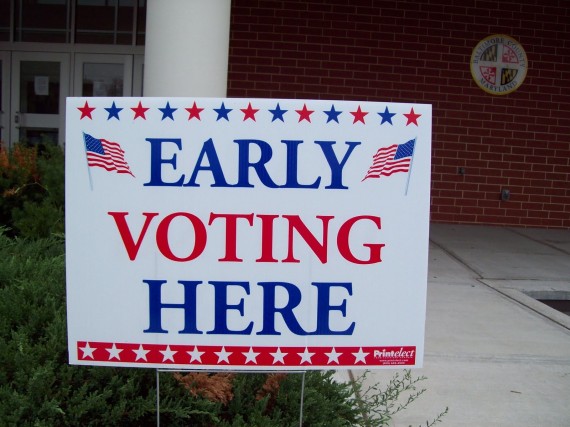
As I noted late last week, as of Saturday voters in half the country are now eligible to vote early either via earlier voting or by submitting an absentee ballot. Within the next two weeks, the number of early voting states will expand even more as states like Ohio open up their month-long early voting period. All of this is happening before the first debate has even taken place, and long before either candidate has had a chance to make their “closing argument” to the American people. It also is arguably happening before voters have all the information about the candidates running for office. That leads Matt Lewis to argue that the entire concept of early voting is a bad idea, and he lists five reasons supporting his argument:
1. It doesn’t work. Researchers at the University of Wisconsin demonstrated that early voting can actually depress turnout. In fairness, they believe same-day registration (which I would oppose for ballot integrity reasons) is a much more important key to increasing voter participation.
Lewis is referring to a study that I wrote about back in October 2010. The authors of the study also explained their findings in a New York Times Op-Ed. As I noted at the time, the findings seem counter-intuitive in that one would think that making it easier to vote earlier would lead to increased turnout. However, the study itself seems sound, and there is support for it in other Political Science literature such as this paper [PDF] published by the American Political Science Association in 2003 that found that early voting had, at best, a nominal impact on voter turnout in the states where it was available. There appears to be very little, if any, actual evidence that early voting makes it more likely that people who wouldn’t vote actually end up voting.
Even if this research is accurate, though, I’m not sure it proves that early voting doesn’t work, because increasing turnout isn’t the only goal of early voting. There’s also the convenience factor and the idea of just making it easier for people to vote to begin with. In that respect, I would say it’s fairly clear that early voting does work.
2. Voters are casting ballots before they have all the information.
In October, there will be three important presidential debates. But Americans who vote today can’t take their votes back if they learn some disqualifying information between now and November 6. And even if the candidates don’t introduce new information or commit some sort of gaffe, what if the world changes?
On the surface, this seems like a good argument. It’s better for our political system as a whole if voters go into the polls with all the information they need to make a decision, and if they’re voting a month before Election Day, and even before debates have started, they arguably aren’t doing that. I see two problems with this argument, though. First of all, the people who are likely to be motivated to vote early are generally the same type of people who are going to be motivated to vote at all, and they are likely to be quite well-informed about the issues in the election and where the candidates stand on the same. I don’t think there’s much dangers of uninformed and low information voters, who are likely to not be paying much attention to the election anyway, making the extra effort to vote early. Second, there have been very few incidents in American history where something happened in the last month of the race that changed it fundamentally. Contrary to many people’s memory, it certainly didn’t happen in the 1980 election, for example. The only instance I can think where a problem might occur would be if a candidate dies before Election Day, but that hasn’t exactly been a common occurrence in American history. Finally, this argument fails to recognize that there are large segments of the American electorate for whom new information would be largely irrelevant. These people are the die hard Republicans and Democrats who are going to vote for their party’s candidate no matter what. I really don’t see the harm in that group of people voting early.
3. The cost — both to the taxpayer and the campaigns. In my home state of Maryland (where early voting is still relatively new), it cost taxpayers $2.6 million, without increasing turnout. But the cost to campaigns might be even greater
We frequently lament how much politicians spend to get elected, but one factor driving the increased cost of campaigns is that politicians have to spend a tremendous amount of time and resources finding out when various voters will actually cast their ballots. That’s because a decent percentage of “undecided” voters wait until the last minute to make up their minds. And so, campaigns wisely attempt to contact them in the last 72-hours prior to their voting. The goal is to contact them just before they vote.
But how do you know when the last minute is for a voter who could potentially vote at any time? (After all, it doesn’t do you any good if a voters sees your mail piece or TV ad the day after they voted.)
There’s no doubt that early voting complicates things for campaigns. Instead of having a single Get Out The Vote effort that is meant to get all of your supporters to the polls on Election Day, you’ve got to factor in the fact that some people are going to vote before Election Day, either in person or by absentee ballot. It also means that you may end up sending last minute campaign literature to people who’ve already voted, but the marginal cost of a single piece of this kind of bulk mail material is actually pretty low. Indeed, there are as many opportunities for campaigns in early voting as there are problems. Most specifically, it was a well-organized early voting operation by Mitt Romney in Florida’s January primary that made his lead there impossible for any of his opponents to overcome. According to several reports, for example, by the time the New Hampshire Primary had taken place the Romney campaign had mailed an absentee ballot application to every single registered Republican in the states, as well as the non-registered voted who had voted in recent Republican primaries. Last week, it was reported that Democrats were far ahead of Republicans in absentee voter applications in Iowa. In elections where turnout can be the deciding factor, such as November’s election is likely to be, a well-organized early voting campaign could be the difference between winning and losing an election.
As for the cost, I’m not sure I see $2.6 million as a huge burden and, as Jazz Shaw notes in his own piece on this topic, if the voters of Maryland, through their elected representatives, believe this is a good idea, then who are we to question the expenditure of money for early voting?
4. Ballot integrity. Unlike early voting, absentee voting is typically done by mail, which opens the door for voter fraud, spouses who are members of opposing parties “losing” ballots, etc. It happens.
This strikes me as mostly a red herring. Absentee ballots have been a part of American politics for decades. Indeed, deployed members of the military can only vote via absentee ballot. The State of Washington votes almost entirely by mail. While there have been anecdotal reports of abuse, there certainly hasn’t been enough to call the whole practice into question.
5. Community. Early voting may be more convenient, but having done both, I can tell you there is something about voting on Election Day that feels special. There is something patriotic and communitarian about it. And I think we lose something when we don’t do it together.
I’m entirely unimpressed by this argument. Having voted in elections since 1986, I cannot say that standing in line to vote and then ending the process by getting one of those “I voted” stickers, which I usually just take off when I get in the car anyway, infuses me with any special sense of community. And it’s hard to feel like you’re part of a community when you go to vote in a primary election and you’re literally the only person there other than the poll workers, something that has happened to me more than once.
I certainly don’t think that every state has to have early voting, or that it needs to be available as early as six weeks before an election, but I don’t see anything wrong with it either. If the people of a certain state want it, then that’s their choice. The argument that early voting somehow interferes with the political process is, mostly, nonsense. If a particular state fabricates rules that allow people to vote starting in September, I really don’t see what’s wrong with it.

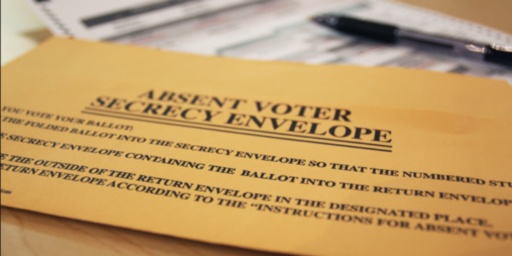
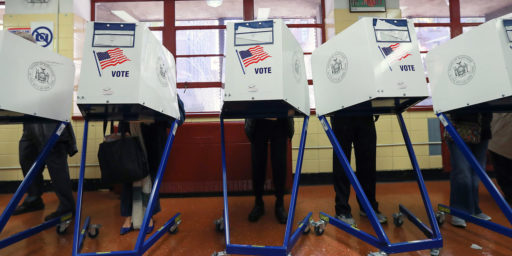
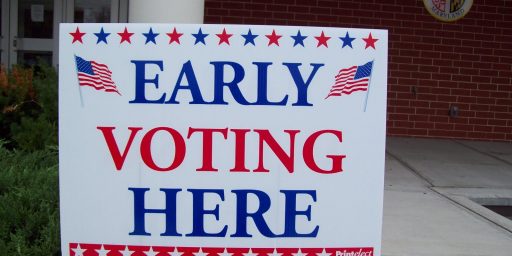
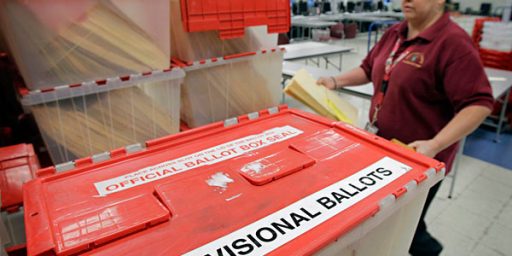
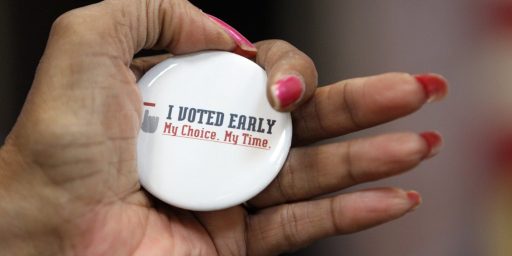
Who cares> As the U.S. becomes a one party state, reforming primaries will be the most important change in elections. Whether people vote early or not when most Americans probably do not vote in a single election that is decided by 10 points of less is laughable.
Who cares what the voters in the 40 states that are not swing states vote, what infomration they have, or even whether those voters show up to polls at all.
Does it really matter at all when a voter in California, Texas, Illinois, Texas, or Mass. goes to the polls?
Yes.
I’d make it so that Early Voting could be no earlier than 2 weeks prior to the election day.
What is galling to me is that absentee ballots take much longer than regular ballots to count and tabulate. Quite often the regular count is done within 24 hours of closing of the polls, then we have to wait while the absentee and early ballots are processed. Screw that.
@al-Ameda:
My understanding is that, by law in pretty much every state, the sealed absentee ballot cannot be opened until the polls have closed on Election Day.
As for early voting results, I’ve found that varies from state-to-state. In the Florida Primary in January, the early voting results were posted by the state board of elections almost immediately after the polls closed in the Florida Panhandle.
After a four hour wait in 2004 out in the cold, that was it for me. I have voted early ever since. It is also more convenient for people who work, have children to pick up and get them home, children’s homework, children’s sports, etc. Why not make it more convenient? I know of a lot of people who will not vote if the lines are too long.
No, I don’t think it is a good idea, at least not in states like California or unless the ballot is solely for President, Senator and Representative.
Our ballots have lots of local elections and an often endless series of initatives. We haven’t even yet received official ballot pamphlets.
And it is difficult, not impossible but quite difficult, to get the real facts behind initiatives because in the past decade or two, sponsors have become so adept at hiding behing non-threatening organization names. (Once upon a time, all I had to do was check to see if Jarvis & Co. were supporting an initiative to know it was a bad idea.) So it usually takes me up to about election date to sort through all the advertising junk and read as much as I can find on all the ballot candidates and issues – at least in part because any, if not most, detail isn’t available at this early date.
Are the people who vote early especially dedicated and knowing about all the down-ballot stuff or do they just not care about anything except the top of the ticket?
Here in Oregon we have had mail-in only voting for around 15 years. It did increase turnout and it saves money which is the main reason it was instituted in the first place. We get out ballots about 3 weeks before the election. Most of them are not actually mailed in but put in drop boxes. They are not counted until “election day.”
@Doug Mataconis:
Thanks Doug. That is certainly the case here in CA.
@Ron Beasley:
But how many competitive elections are there in Oregon. When a state is a one party state like Oregon, do state and local elections really matter. Or is the purpose of the mail in ballot so that the state can say that it has had an election even though none of the races were ever in doubt.
@superdestroyer: That’s a fairly recent development. Until 2006 both State Houses were held by the Republicans. What happened here was the State Republican Party was taken over by the Bible thumpers. Don’t forget until 2002 Oregon had two Republican Senators. My congressional district is very blue, the Republicans don’t even have a candidate on the ballot. But one is just as red and the a couple are swing.
Superdestroyer in a nutshell: Negroes and Brown folks are going to vote Democratic no matter how racist Republicans get. Therefore . . . Um. . . Okay, that’s it. The coloreds is gonna vote Democratic. So, er. . . um. . .
As always, SD, thank you for your repetitive and terribly clever contributions.
The only valid point brought up by Lewis is cost to the taxpayer.
Everything else is sloppy thinking or just stupid.
I find it to be quite the opposite, particularly with absentee ballots. From home I can research the candidates, read the voters pamphlet statements, etc. – information I would not have in the high-pressure ballot box where name recognition rules all.
@michael reynolds:
Oregon is one of the whitest states in the U.S. and Portland has the whitest urban core for large cities in the U.S. However, due to the culture and the demographics of Portland cause it to be one of the bluest cities in the U.S. So much so, that instead of thinking about Oregon being a blue state, Oregon is really state with one urban area that is overwhelmingly Democratic.
However, does anyone really believe that a city where white 20-something go to retire is going to vote against the party that promises more entitlements?
@LC: The down-ballot races are exactly why I support absentee ballots.
Here in Seattle, Republicans have succeeded in making many of the offices “non-partisan”, since we have a one party state and the only way a Republican can win is to pretend to not be a Republican. (Hi Superdestroyer!) Identifying the Republicans takes time and research, which is best done at home, rather than in the voting booth with an iPhone. Auxiliary Port Commishioner? Who follows that, or even knows it is on the ballot?
And we have countless stupid referendums and initiatives. Ok, it’s easy to vote against all initiatives and for all referendums, and that’s almost always the right thing, but it’s better to be able to take three hours filling out the ballot, researching candidates, checking endorsements, etc.
@Gustopher:
Thanks for confirming that one of the main purposes of mail ballots is to maintain the one party state. Also, I have always suspected that as the U.S. becomes a one party state that the Democrats would try to put an end to to initiative and referendum and it appears that mail ballots serve that function. I guess the Democrats in Washington do not have as friendly judges as the Democrats have in California.
True. But Americans also can’t take their votes back if they learn some disqualifying information on November 7th either. New information can always come up, but at a certain point you just have to cross your fingers and vote.
Is this about early voting or voting by mail-in? They are not the same thing although the mechanics of mail-in voting means you need to get the ballots in peoples hands at least a week before they are due. We have mail-in voting in WA and I love it, much better than going to polling places. You know how you are going to vote at the top but down ballot, being able to check the internet while your voting is a huge advantage. No lines, no fuss, fill out the ballot in one night or take your time, drop it off at the fire station when you are done or mail it in.
In truth, I almost always wait till the night before but I still get to look things up when I am voting. For the endless initiatives we get in WA, that is a big help.
Early voting is a choice. If I miss out on “community” or last minute info or whatever, then that is my choice.
That guy can pound sand – I like my early voting.
Cheers.
The problem is that the US is the only country that I remember(UK is the only other exception) that holds elections in the middle of the week. Considering the fact that seniors have a huge political clout, since they vote in bigger number than the rest of the population, that´s a point to be considered.
There’s information about candidates? Where? I haven’t seen any of it on there “vote for me” websites…
Sorry, LC but you and your fellow Californians have had oh, I don’t know–all year long to familiarize yourself about issues. I’ve voted in California, and it’s not like cramming for the PSATs.
Lots of us follow issues throughout the year. Indeed we’ve been doing so since the LAST presidential election and don’t need a debate to help us crystalize our thoughts. They are clear and we know who we prefer. Furthermore…
1) it is not the responsibility of anyone but each individual citizen to exercise their voting privileges. I don’t give a damn whether it inflates or deflates turnout. Neither should you. People should get off their asses and vote–if they don’t blame them not the process. Isn’t being Libertarian about taking responsibility. Let’s do that.
2) of all things to bitch about as a waste of money, this is hardly one. The amount is minuscule compared to your states spending overall and the convenience for those of us availing ourselves of the convenience is well worth it in my estimation.
3) as mentioned above, I have spent four years engaged in current events. I don’t require a silly scripted Q&A posing as the Lincoln-Douglas debates to validate my opinion.
This “issue” would be really high on my list of non-problems. God knows we have enough real one’s to fix This one can be ignored.
No. I’m glad we’ve covered that. Being Libertarian is all about avoiding responsibility. Think about it. Every four years you can proudly claim “I didn’t vote for that guy”. And then continue to bitch.
I mailed my comment in.
@michael reynolds:
Superdestroyer in a nutshell (Superdestroyer in a nutshell):
I dunno why the guy wastes so much bandwidth.
I think Tuesday is an awful day to have voting anyway. When I was a child I remember businesses and schools closed on election day, but that wouldn’t fly now.
While my state doesn’t have early voting, I can see some benefit in at least opening the polls the week before and having open hours on Saturday and Sunday.
As long as there is some process to determine voter eligibility I see no huge problems with voting early, and I imagine most early voters are people who are unlikely to change their votes before the actual election day.
Really? You really believe there is anything else to know?
As Bill Maher said:
Emphasis mine.
In politics, no act — no matter how altruistic it may be intended — is without a perceived partisan effect.
So it is with the current Get-Out-the-Vote and early voting efforts.
As it is with the efforts to prevent voter fraud.
The underlying tone of one is that expanding the electorate will help President Barack Obama get re-elected. The underlying tone of the other is that putting more legal controls on who votes and when will aid the Republicans and Mitt Romney.
The main reason the Fifteenth Amendment (1870) was ratified did not lie in the fact that black males, recently freed from slavery, should have the right to vote (they certainly should) but that the Radical Republicans of the day knew that if they could vote, they would be reliably Republican.
The Nineteenth Amendment (1920) giving women the right to vote took much longer, in part because politicians couldn’t figure the partisanship angle: what side would women take once they could vote? Had that been clear, women likely would have gained the right to vote much sooner.
Exercising the right to vote and maintaining the integrity of the voting system are both good things — but they’re both highly political and partisan activities.
It works for me. I am not going to be changing my preferences between now and November. I’ve heard what’s been said and there are no surprise reveals likely. If you can come up with a photo of Obama and Romney boning each other… well, then I might look for a third party. Not that it’s wrong, just that it would alter my expectations of either.
By voting early, I can utterly tune out all the froth and bother that will be flooding the media — including blogs — as soon as I mark my ballot. I can tell the myriad folk who think I need phone calls to piss off.
There’s simply no down side for me individually. I think there’d be even fewer for those living in places where the vote is going to one side or the other, with no doubt.
@superdestroyer:
I am happily voting absentee for Massachusetts this year so I can get a vote in for Elizabeth Warren. So, yes, it does matter. And one more vote to run up that score for Obama is worthwhile, too.
@sam: “I dunno why the guy wastes so much bandwidth.”
The smug safety of having lost and being right at the same time, the supposition that if one admits the loss, one is free to then wallow like a pig in heat over a future about which one is “right.” The wallowing then supports unspeakable dopamine production.
Reality — not even a crack of it — is not required.
@C. Clavin:
Apropos of this, SNL nailed it this week.
Don’t worry Matt, if it does change, it’ll be just as fwcked up then as it is now.
@Jim Stovall: How about the get out the “vote early and often” effort?
I love the community claim. I bet Matt Lewis supports voter ID, Now I know my poll workers, who also work the early voting station- we are a community. We get the same interaction at the early voting station as we do at the election day station. But even though we know each other (cause of the community thing) it’s become a big deal for Republicans to demand voter ID laws on the understandable hunch that Democrats are less likely to have an ID. Likewise, I can’t buy the claim that early voting doesn’t increase turnout. We see in the last couple of years twin efforts by Republicans to reduce early voting and to add barriers, in the name of reducing fraud and saving money. Apparently, we are to pay no attention to the effects of these efforts in reducing the voter turnout.
I live in Washington state and vote entirely by mail. The change was relatively recent, and personally, I preferred the option to vote in person. My polling station was within walking distance and a minute or two away driving through my neighborhood. The mail drop box requires a drive that can be 20-30 minutes round trip. I don’t believe in having to buy a stamp to vote, and don’t trust the security of local mailboxes, so it’s actually harder for me to vote now than it was before. I vote the evening my ballot arrives, and then my ballot sits unmailed in my house until a few days before the election, some weeks later. I preferred the civic experience of voting in person.
The best option in my view would be to preserve all options for voting. Keep the neighborhood polling stations and have same-day voting (and same-day registration), and make election day a holiday, but also mail out ballots to everyone automatically so people can vote by mail if they choose. In either case, mail or in-person voting, people have to sign in to vote and duplicate sign-in isn’t allowed, so there’s no additional opportunity for fraud (which statistically almost never occurs anyway.)
@LC:
Early voters here in Georgia tend to be the one who have studied the issues during the preceding 8 to 10 months of campaigning. By the time early voting comes around they have decided on the issues. They also tend to be active in party politics or voter mobilization efforts and want to be free on election day to help transport voters to the polls, act as poll watchers, work phone banks, and many of the other labor intensive thngs that go on during an election. Voting early gives them time to do that without worrying about casting a ballot on election day. I always point out that educated retired citizens have little to do but take their medicines, write their senators and representatives, calculate Social Security benefits, and decide which politician will do their bidding. They know by Labor Day who they intend to to vote for and which way they will vote on ballot issues. Let them vote early.